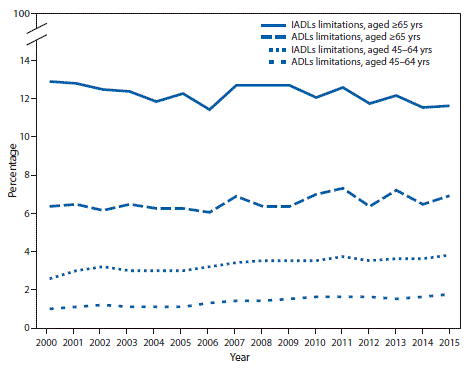QuickStats: Percentage of Adults Aged ≥45 Years with Activity Limitations, by Age Group and Type of Limitation* — National Health Interview Survey,† United States, 2000–2015
Weekly / August 26, 2016 / 65(33);884

Abbreviations: ADLs= activities of daily living; IADLs= instrumental activities of daily living.
* Limitations in ADLs are based on response to the question, “Because of a physical, mental, or emotional problem, does [person] need the help of other persons with personal care needs, such as eating, bathing, dressing, or getting around inside this home?” Limitations in IADLs are based on response to the question, “Because of a physical, mental, or emotional problem, does [person] need the help of other persons in handling routine needs, such as everyday household chores, doing necessary business, shopping, or getting around for other purposes?”
† Estimates are based on household interviews of a sample of the noninstitutionalized U.S. civilian population and are derived from the National Health Interview Survey Family Core component.
The percentage of adults aged 45–64 years with limitations in activities of daily living (ADLs) increased from 1.3% in 2000 to 2.0% in 2015, and the percentage with limitations in instrumental activities of daily living (IADLs) increased from 2.8% to 4.0%. Among adults aged ≥65 years, the percentage with limitations in ADLs increased from 6.4% to 6.9%, and the percentage with limitations in IADLs decreased from 12.9% to 11.7%.
Source: National Health Interview Survey, 2000–2015. http://www.cdc.gov/nchs/nhis.htm.
Reported by: Ellen A. Kramarow, PhD, ekramarow@cdc.gov, 301-458-4325.
Suggested citation for this article: QuickStats: Percentage of Adults Aged ≥45 Years with Activity Limitations, by Age Group and Type of Limitation — National Health Interview Survey, United States, 2000–2015. MMWR Morb Mortal Wkly Rep 2016;65:884. DOI: http://dx.doi.org/10.15585/mmwr.mm6533a8.
Use of trade names and commercial sources is for identification only and does not imply endorsement by the U.S. Department of
Health and Human Services.
References to non-CDC sites on the Internet are
provided as a service to MMWR readers and do not constitute or imply
endorsement of these organizations or their programs by CDC or the U.S.
Department of Health and Human Services. CDC is not responsible for the content
of pages found at these sites. URL addresses listed in MMWR were current as of
the date of publication.
All HTML versions of MMWR articles are generated from final proofs through an automated process. This conversion might result in character translation or format errors in the HTML version. Users are referred to the electronic PDF version (https://www.cdc.gov/mmwr) and/or the original MMWR paper copy for printable versions of official text, figures, and tables.
Questions or messages regarding errors in formatting should be addressed to mmwrq@cdc.gov.
- Page last reviewed: August 17, 2017
- Page last updated: August 17, 2017
- Content source:


 ShareCompartir
ShareCompartir